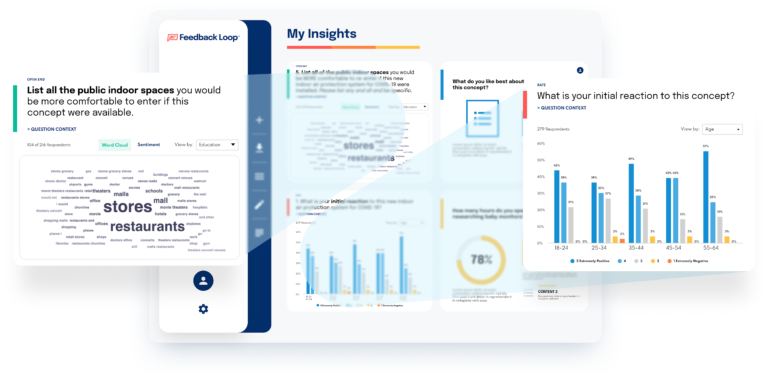30-second summary:
- The Ad Council needed to create messaging about the benefits of wearing masks that resonated with people throughout the US.
- They faced several challenges including and extremely limited lead time for developing the campaign, constantly changing consumer sentiment about masks and COVID-19, and political and social upheaval which impacted their messaging strategy.
- Using an agile research platform, The Ad Council obtained consumer insight within three-five days, significantly reducing the typical nine-month lead time for obtaining data and deploying a new campaign.
- Intention or motivation was higher for the mask-wearing campaign versus other campaigns. It reached 70% of Americans and raised over $400 million in donated media support.
Headquartered in Manhattan, The Ad Council is a nonprofit ad agency focused on creating social good campaigns and public service announcements (PSAs) in the US. The company has weathered nearly a century of change, upheaval, and crises—up to and including the COVID-19 pandemic.
Last July, the Ad Council was presented with a new challenge—educate Americans about the benefits of wearing masks to prevent the spread of COVID-19.
We spoke with Catherine Chao, Ad Council’s VP of Strategy & Evaluation, to discuss the unique challenges her team faced in creating unifying messaging about mask wearing throughout the US.
Addressing changing consumer sentiment in real time
Chao leads the COVID-19 mask strategy team. She and her team of strategists gather research that informs the strategy and creative of the campaign’s PSAs and messaging.
Throughout 2020, consumer sentiment, CDC guidelines, and the political environment created constant change and uncertainty around mask wearing. This posed a challenge for Chao’s team, who needed to understand consumer sentiment quickly and in real-time.
(Read more...) Ad Council wanted to go beyond the traditional methods of getting the word out about mask wearing and extend their messaging to other partners and stakeholders.
Says Chao, “We saw how fragmented the communication was around the pandemic and we wanted to help unify some of that messaging. There’s been so much confusion and it’s unfortunately been a major barrier to mask usage and vaccine uptake.”
It typically takes about nine months from when Ad Council starts its formative research for a campaign to when they launch the creative. But they needed to move much more quickly for their mask campaign. Chao’s team turned to Feedback Loop, an agile research platform that enabled them to collect consumer data in under a week.
An agile approach to research
Ad Council had almost no time to ramp up to their mask-wearing campaign, so they turned to technology to quickly gauge consumer sentiment across different demographics.
“One example of how we leveraged agile research was with our You Will See Me creative,” says Chao. “That was specifically targeted for Black Americans who were being disproportionately affected by COVID-19. We needed specific tailored messaging for this audience. We were in the middle of finalizing our concepts when George Floyd was murdered.”
Chao’s team needed to make sure the messages about mask wearing were still relevant, but also spoke to what was happening in the moment with police brutality, racism, and the subsequent Black Lives Matter protests.
“We were telling people to protect themselves against COVID-19 when many people were more frightened of police brutality and racism. We adapted our messaging and put it into Feedback Loop to get a read on how relevant it was in the moment.”
The technology enabled Ad Council to get validated insights quickly, ensuring that the direction of their messaging was still right for the audience.
Traditional and agile research form a holistic picture
Feedback Loop’s platform facilitated the rapid deployment of research and collection of data. The tool enabled Ad Council to complete their research in about three to five days, though the length varies depending on the type of test used and the sample size. Survey data was delivered to Chao’s team via a dashboard built into the platform.
Insight dashboard provided by Ad Council
For most campaigns, Ad Council combines agile research data with traditional data from quantitative surveys and interviews, focus groups, and in-depth interviews. This allows them to get information about unconscious motivators and psychological reasons behind people’s behavior.
“It’s helpful to use all of these things together because we’re often able to connect an unconscious behavior to a specific question,” says Chao. “Then we can add that segment into the agile research process or look at other results like creative feedback based on this underlying barrier.”
Chao noted that agile research technology not only speeds up the process of gathering consumer feedback, but it also makes getting the data more affordable to an agency like Ad Council which is a nonprofit.
Getting the word out as a measure of success
There are many factors that affect mask wearing behavior, so Ad Council didn’t use this as a measure of campaign success.
Instead, they looked at the level of ad exposure, the amount of donated media support, and total ad impressions. By all three measures, the mask campaign was a resounding success.
- Ad Council received $407M in donated media support
- Donated media impressions reached 40.7 billion
- About seven out of 10 Americans recognize at least one of Ad Council’s COVID-19 campaigns
Additionally, agile research technology enabled Ad Council to get feedback in a fraction of the time it typically takes—three to five days versus nine months—and this helped them develop relevant, timely messaging throughout the life of the campaign.
Says Chao, “When I think of success, I look at our results. I look at this campaign compared to our norms with previous campaigns. What we’re seeing with some of our PSAs is the intention or motivation is higher compared to other campaigns. We consider that a success. A 30-second ad may not completely move someone, but it may get them to think about mask wearing a little bit differently and that could snowball into the actual behavior.”

